

Google's Plan to Keep You Online All the Time. Google’s business only works when people are online.
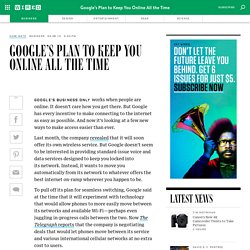
It doesn’t care how you get there. But Google has every incentive to make connecting to the internet as easy as possible. And now it’s looking at a few new ways to make access easier than ever. Last month, the company revealed that it will soon offer its own wireless service. But Google doesn’t seem to be interested in providing standard-issue voice and data services designed to keep you locked into its network.
To pull off its plan for seamless switching, Google said at the time that it will experiment with technology that would allow phones to more easily move between its networks and available Wi-Fi—perhaps even juggling in-progress calls between the two. The more you're online, the more you'll use Google's search engine and other apps — and the more the company can serve you ads. Google to launch own 'virtual' mobile phone network. Google is planning to launch its own mobile phone network, the software and search firm has confirmed, as it plots a major business shift that will see the company move into supplying broadband connections across the planet Details of what Google insiders are calling “Project Nova” were unveiled by Sundar Pichai, recently promoted as second in command to co-founder Larry Page, at the Mobile World Congress trade show in Barcelona.
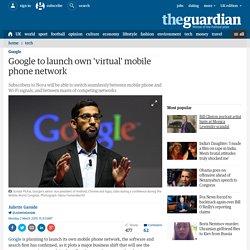
The world’s largest mobile computing show also saw Facebook founder Mark Zuckerberg outline his strategy for connecting the four billion people worldwide who still have poor internet connections or simply live life offline, through his Internet.org project. Subscribers of Google’s “virtual network” will be able to switch seamlessly between mobile phone and Wi-Fi signals, and between the masts of competing mobile phone networks, as their phones seek out the best signals. Google Creates A Real-Life "Easy Button" That Can Do Anything With A Tap. I never understood why anyone would want a smart watch--another silly screen strapped to their wrist.
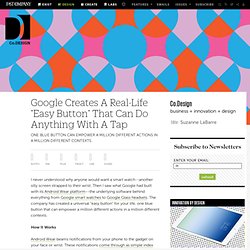
Then I saw what Google had built with its Android Wear platform--the underlying software behind everything from Google smart watches to Google Glass headsets. The company has created a universal “easy button” for your life, one blue button that can empower a million different actions in a million different contexts. How It Works Android Wear beams notifications from your phone to the gadget on your face or wrist. Google Is About To Take Over Your Whole Life, And You Won't Even Notice.
“I have a weird question for you,” I stammered, sitting in a hotel room across from Matias Duarte and Jon Wiley, the design leads for Google Android and Search, respectively.
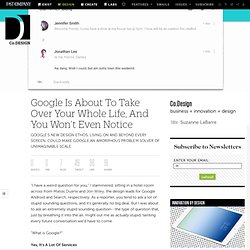
Google Promotes Open Standards to Advance Internet of Things. Tech in the spotlight Posted by Sheila Shayon on December 17, 2014 04:04 PM Google is reaching out to the academic community to submit proposals for an Internet of Things (IoT) open standards program to be called the 'Open Web of Things.' The initiative’s goals are to further the development of open standards, facilitate ease of use and ensure that privacy and security are fundamental values in the evolution of the IoT.
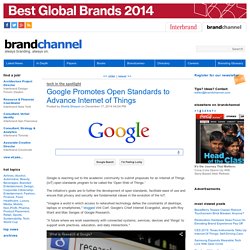
"Imagine a world in which access to networked technology defies the constraints of desktops, laptops or smartphones," blogged Vint Cerf, Google's Chief Internet Evangelist, along with Roy Want and Max Senges of Google Research. "A future where we work seamlessly with connected systems, services, devices and 'things' to support work practices, education, and daily interactions. " Welcome to Google Island. Google IO attendees visit Google’s virtual island Photo: Alex Washburn/Wired I awoke aboard a boat, just before daybreak, which was weird.
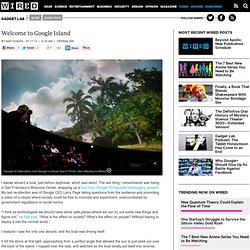
The last thing I remembered was being in San Francisco’s Moscone Center, wrapping up a four-hour Google I/O keynote liveblogging session. Into the future: Pros and cons of a Google world. Peter Bazalgette, media consultant, investor and former producer of Channel 4's Big Brother As the channels of communication become more complex, and the TV schedule dies, the search to find a particular piece of content becomes more important.
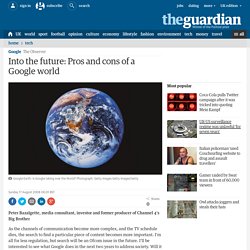
I'm all for less regulation, but search will be an Ofcom issue in the future. I'll be interested to see what Google does in the next two years to address society. Will it take on any additional public service responsibilities? Google is brilliant and a great public utility but don't assume it is going to be totally dominant in the future. The tech utopia nobody wants: why the world nerds are creating will be awful. In San Francisco, the centre of the US tech revolution, restaurant workers are lobbying for a minimum wage increase.
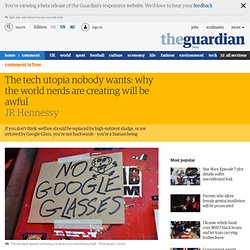
In response, a conservative lobby group that campaigns on behalf of the restaurant industry threatened to replace the workers with iPads. Restaurant workers already claim food stamps at twice the rate of the rest of the US population because their wages are so low. Because of this, after they fall prey to the march of the tablets, America's waiters and waitresses could be the subjects of yet another social experiment: in a recent thought-bubble, Google engineer and activist Justine Tunney suggested last month that food stamps should be replaced with Soylent, a grey nutritional slurry mooted as a total meal replacement, to keep poor Americans "healthy and productive".
Soylent was rapidly accepted by the Silicon Valley technorati, who backed the project's Kickstarter to the tune of $1m. Now the blowback has arrived. How Google Is Taking Over Our Lives. Call it innovation.
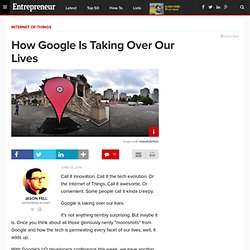
Call it the tech evolution. Or the Internet of Things. Call it awesome. Google Enters the Collaborative Economy in a Big Way. Here comes Google, with a series of five market moves injecting them as a central player for the collaborative economy.
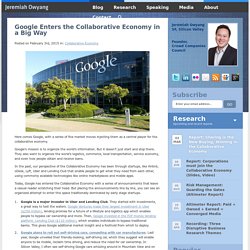
Google’s mission is to organize the world’s information. But it doesn’t just start and stop there. They also want to organize the world’s logistics, commerce, local transportation, service economy, and even how people obtain and receive loans. In the past, our perspective of the Collaborative Economy has been through startups, like Airbnb, oDesk, Lyft, Uber and Lending Club that enable people to get what they need from each other, using commonly available technologies like online marketplaces and mobile apps. The 5 Things We Know About Google's Five Year Plan (art by Graziano Origa) Almost everyday there are stories covering Google's new projects or the evolution of it's many products. With so many initiatives it can be hard to step back and look at where the web behemoth is really heading. What does success in five years look like?
Back in 2009, Eric Schmidt denied the existence of any formal five year plan, but with Larry back in the drivers seat it's not hard to imagine him sitting cross legged at Burning Man, chatting to Serge about how everything fits together. Based on some of the recent acquisitions, new developments and the evolution of their current products, the plan probably goes something like this: 3 Future Google Projects That Will Change Your Life. Twitter49 Facebook82 LinkedIn43 Google Plus21 It seems like a fairytale story few are capable of conjuring, or a creation plucked straight from an X-Men movie, but the giant behemoth Google maintains a low-profile research lab known as Google[x] just half a mile away from its corporate headquarters in Mountain View, California.
What distinguishes Google[x] from other regional labs? Your future. Astro Teller, Director of Google[x] Products, stated “when we come up against things we can’t forecast, we assume if we can’t imagine it, it isn’t possible.” By that same philosophy, Teller and his fellow league of extraordinary colleagues highlighted mind-blowing project plans ranging from whimsical Willy Wonka-esque space elevators, 100x fast broadband connectivity, to advanced robotics emphasized in Google’s driverless car.
5 things Google Inc will conquer in the future (according to Larry Page) Google CEO Larry Page just published his annual founder’s letter for shareholders and, as usual, it’s a fascinating glimpse into where Page thinks Google is going, how it’s going to get there, and what the company will conquer in the future. Sure, he mentions the usual things: search and email and being always logged in through Chrome so that your stuff can be seamlessly accessed on a laptop, phone, or even on your TV. But there are also a couple of surprises in there.
Here we quote five of them. 1. Same-day delivery shopping: “We’re excited about our new Google Shopping Express service, which is a great way to get deliveries the same day you order them.” Americans Aren’t Ready for the Future Google and Amazon Want to Build. A kidney structure being printed by the 3-D printer at Wake Forest Institute for Regenerative Medicine. Image: Wake Forest Baptist Medical Center Americans are hopeful about the future of technology. But don’t release the drones just yet. And forget meat grown in a petri dish. Pushing new tech on a public that isn’t ready can have real bottom-line consequences. That’s the takeaway from a new study released by the Pew Research Center looking at how U.S. residents felt about possible high-tech advances looming in the not-too-distant future. Why I won’t work for Google. Hi Niklas,Patrick here from Google.I looked over your Github and LinkedIn profiles, and personal site (having found the panic_bcast project), and was keen to get in touch regarding a number of Engineering positions here at Google.Your Open Source contributions and projects, Systems/Networking experience and development background looked relevant to what some of the engineers here are doing, but I wanted to touch base with you first to understand a bit more about your work.If your schedule permits it, would you be open to a conversation next week?
The positions I had wanted to share with you are part of a mission-critical team that combines software development, networking and systems engineering expertise to build and run large scale, massively distributed, fault-tolerant software systems and infrastructure.Thanks for your time and have a good weekend.Best regards, Patrick Hi Patrick, My father found out quickly and we had a long chat about life’s importance. Regards, Niklas.
Department of regime change. Google surveillance. Anti Google Glass. Google X. Google Energy. Google Satellites. Low orbit drone-Telcos. LOON. Google Drones. Google car. Ray Kurzweil. Google AI. Google genes. Google immortals. Anti-aging Calico.